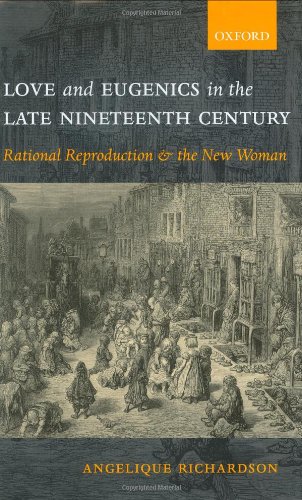Love and Eugenics in the Late Nineteenth Century: Rational Reproduction and the New Woman - Hardcover

The idea of eugenics - human selective breeding - originated in Victorian Britain in response to the urban poor. Darwin's evolutionary theory had laid the foundations for eugenics, replacing paradise with primordial slime. Man had not fallen from Grace, but risen from the swamps. And, as architect of his own destiny, he might rise still further. Eugenics was developed by Darwin's cousin Francis Galton in the 1860s. Embracing the idea of evolution, eugenists argued that through the judicious control of human reproduction, and the numerical increase of the middle class, Britain's supremacy in the world could be maintained. Born and bred among the competitive Victorian middle class, eugenics was a biologistic discourse on class. Aiming at 'racial improvement' by altering the balance of class in society, it was, Galton argued, 'practical Darwinism'. Eugenics found its most sustained expression in fiction and the periodical press, and was central to late nineteenth-century ideas on social progress, forming part of the debate between hereditarians and environmentalists that peaked in the closing years of the century.Even Gladstone had his vital statistics measured in Galton's eugenic laboratory. Among the champions of eugenics were social purity feminists and New Women, writers such as George Egerton, Ellice Hopkins, and Sarah Grand, who argued that women were naturally - biologically - moral, and that through rational reproduction middle-class women could regenerate the British imperial race. The New Woman has been the subject of numerous recent critical works. However, the oppressive ideas that coexisted with the mancipatory theories of some New Women - ideas that were supremely class conscious - remain largely unexamined, as the focus remains on her more progressive aspects. Love and Eugenics in the Late Nineteenth Century recontextualizes New Woman writers, demonstrating that they were as concerned with the questions of poverty, sickness and health as they were w
"synopsis" may belong to another edition of this title.
Review:
One of the most challenging and original studies I have come across for a long time. (John Carey)
...an illuminating examination of the ways in which feminist writers incorporated eugenics and notions of rational reproduction into fiction in the late nineteenth and early twentieth centuries. (Lara Marks, Medical History)
beautifully written and meticulously argued (Naomi Hetherington, Textual Practice)
Richardson's highlighting of the diverse ways in which love was constructed is compelling... elegantly and cogently brings together a wide range of eugenic and anti-eugenic sources and thinkers. (Lucy Delap, Women's History Review)
Swiftly establishes itself as a very significant contribution to the expanded field of New Woman scholarship... of Grand, of the feminism of the period and of the cultural history of eugenics itself. (Carolyn Burdett, Women: A Cultural Review)
Richardson enriches our understanding of the connections between feminist thought and Victorian biological science. (Chris Waters, History Workshop Journal)
a very well-written and thoughtful piece of scholarship that successfully combines historical analysis and literary criticism. It is a welcome and important contribution to the cultural study of British eugenics and early feminism and, crucially, to the relationship between the two. (Nadja Durbach, H-Net)
Richardson provides a valuably warts-and-all history of how feminism intersected with biological racism and hereditary elitism. As a result, this is a genuinely important contribution to the history of British feminism. (John Waller, British Journal for the History of Science)
A finely organized and superbly researched study which significantly extends our knowledge of a literary cadre. (Roger Ebbatson, Thomas Hardy Journal)
About the Author:
...an illuminating examination of the ways in which feminist writers incorporated eugenics and notions of rational reproduction into fiction in the late nineteenth and early twentieth centuries. (Lara Marks, Medical History)
beautifully written and meticulously argued (Naomi Hetherington, Textual Practice)
Richardson's highlighting of the diverse ways in which love was constructed is compelling... elegantly and cogently brings together a wide range of eugenic and anti-eugenic sources and thinkers. (Lucy Delap, Women's History Review)
Swiftly establishes itself as a very significant contribution to the expanded field of New Woman scholarship... of Grand, of the feminism of the period and of the cultural history of eugenics itself. (Carolyn Burdett, Women: A Cultural Review)
Richardson enriches our understanding of the connections between feminist thought and Victorian biological science. (Chris Waters, History Workshop Journal)
a very well-written and thoughtful piece of scholarship that successfully combines historical analysis and literary criticism. It is a welcome and important contribution to the cultural study of British eugenics and early feminism and, crucially, to the relationship between the two. (Nadja Durbach, H-Net)
Richardson provides a valuably warts-and-all history of how feminism intersected with biological racism and hereditary elitism. As a result, this is a genuinely important contribution to the history of British feminism. (John Waller, British Journal for the History of Science)
A finely organized and superbly researched study which significantly extends our knowledge of a literary cadre. (Roger Ebbatson, Thomas Hardy Journal)
Angelique Richardson is a Senior Lecturer in the Department of English at Exeter University.
"About this title" may belong to another edition of this title.
- PublisherOUP Oxford
- Publication date2003
- ISBN 10 0198187009
- ISBN 13 9780198187004
- BindingHardcover
- Number of pages276
- Rating
Buy New
Learn more about this copy
£ 271.85
Shipping:
£ 10
From United Kingdom to U.S.A.
Top Search Results from the AbeBooks Marketplace
Love and Eugenics in the Late Nineteenth Century: Rational Reproduction and the New Woman
Published by
Oxford Univ Pr
(2003)
ISBN 10: 0198187009
ISBN 13: 9780198187004
New
Hardcover
Quantity: 1
Seller:
Rating
Book Description Hardcover. Condition: Brand New. 1st edition. 280 pages. 8.50x5.50x1.00 inches. In Stock. Seller Inventory # 0198187009
Buy New
£ 271.85
Convert currency

